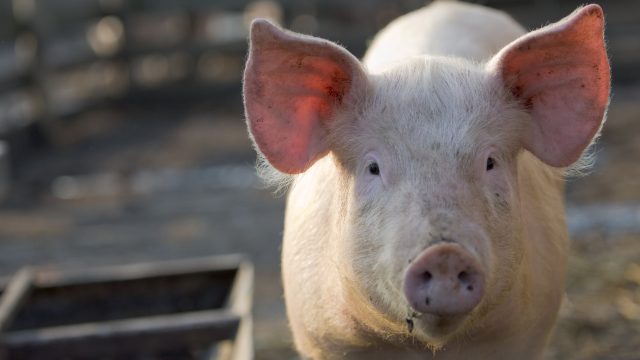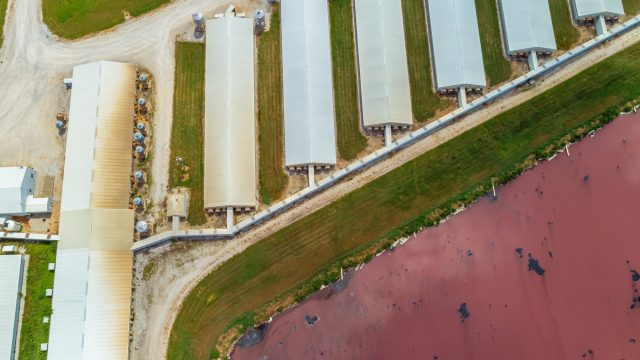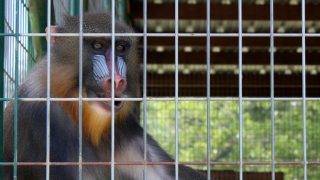
Animal Exploiter: Jason Clay
Animals, human workers, and visitors have been harmed by violations at Clay's Texas roadside zoos
At substandard, unaccredited roadside zoos across the U.S., animals suffer every day.
In these facilities, captive wild animals are commonly denied adequate food, water, and veterinary care, and kept in conditions that fail to meet their complex physical and psychological needs.
The Animal Legal Defense Fund has taken on inhumane roadside zoos across the country, helping hundreds of animals find sanctuary and setting important legal precedents along the way.
 Our series of regulatory actions in 2022 set out to protect animals and people alike at two Texas roadside zoos owned by captive wildlife exhibitor Jason Clay.
Our series of regulatory actions in 2022 set out to protect animals and people alike at two Texas roadside zoos owned by captive wildlife exhibitor Jason Clay.
Our official complaints to the U.S. Department of Agriculture (USDA) and the Occupational Safety and Health Administration (OSHA) urge the federal agencies to investigate and take necessary enforcement action against this serial violator of animal protection and workplace safety laws.
In June 2022, Clay was indicted for criminal wildlife trafficking by a federal grand jury.
From Internet Stardom to Death in a Roadside Zoo
In 2017, the Internet went wild over the live-streamed “birth watch” of a reticulated giraffe named April. The eventual arrival of April’s calf at a New York roadside zoo was viewed by millions — many of whom tuned in again for the birth of her next calf, Azizi, in early 2019.
That November, Azizi was transferred to Clay’s East Texas Zoo and Gator Park. Less than a year later, the young giraffe died there — due to a “twisted gut,” according to Clay.
Sadly, Azizi isn’t the only animal to have died prematurely at one of Clay’s facilities.
Countless others have endured the following:
- Denied appropriate veterinary care
- Kept in filthy conditions
- Denied water
- Confined in structurally unsound enclosures
- Improperly sold or transferred between facilities without required documentation
- Subjected to unsafe handling by park staff and visitors
- Denied adequate psychological enrichment
- Allowed to be inhumanely treated and drugged during the taping of a staged “reality” TV show
- Even simply lost
The Animal Legal Defense Fund Steps In
The USDA has documented numerous violations of the federal Animal Welfare Act (AWA) at Clay’s facilities over a period of years, with over two dozen violations in 2021 alone. But the agency has nevertheless continued to allow him to exhibit captive wild animals — nearly 700 in all — at the roadside zoos East Texas Zoo and Gator Park and Franklin Drive Thru Safari.
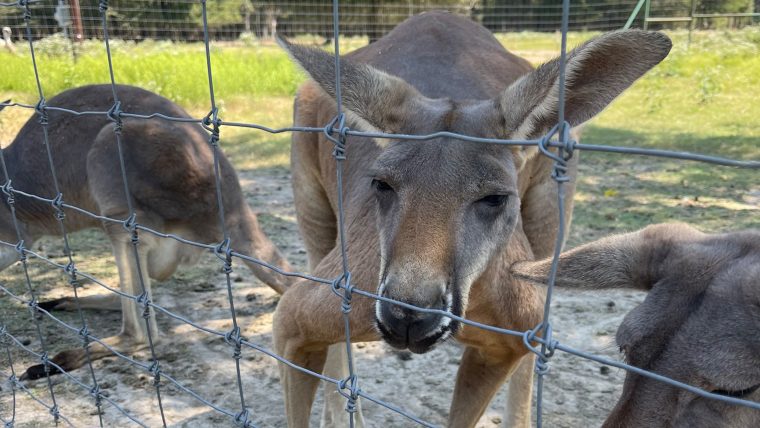
In January 2022, the Animal Legal Defense Fund filed a complaint with the USDA, urging the agency to revoke or decline to renew the AWA exhibitor license that allows him to operate these facilities, fine him for violations, and transfer the animals to reputable sanctuaries where they can receive proper care.
According to the agency’s AWA licensing regulations, it may only reissue an exhibitor’s license if the exhibitor can demonstrate their ability to comply with the AWA and all applicable federal, state, and local laws. Clay’s history clearly indicates the opposite.
“As the USDA is aware, the AWA and its implementing regulations prohibit the issuance of licenses to exhibitors like Jason Clay who are not in compliance with legal standards. If followed, the new USDA licensing process should prohibit the issuance of licenses to exhibitors like Clay who cannot show compliance with the AWA.”
—Animal Legal Defense Fund Executive Director Stephen Wells
‘Acutely and Suspiciously’
In a June 2021 report, an inspector with the USDA’s Animal and Plant Health Inspection Service (APHIS), which inspects roadside zoos like Clay’s, addressed the deaths of a pygmy hippo and a young giraffe in Clay’s care.
“When asked if the attending veterinarian was contacted about the animal before or after [their] death, [Clay] said no,” the inspector wrote of the hippo. “When animals die acutely and suspiciously, as seems to be the case with the giraffe and the hippo, the veterinarian should be notified.”
In light of these animals’ deaths without apparent veterinary intervention, as well as an aardvark who was “missing the tip of [their] tail” and had not been seen by a vet, Clay was cited by the inspector for a critical violation. He later received an “official warning” from the USDA, notifying him of his obligation to “establish and maintain programs of adequate veterinary care that include … [t]he use of appropriate methods to prevent, control, diagnose, and treat diseases and injuries, and the availability of emergency, weekend, and holiday care.”
Chronic Noncompliance
Clay’s history of animal care violations goes back years — indeed, all the way back to his first known USDA inspection in 2014.
That inspection resulted in him being cited for AWA noncompliance — as well as a $1,750 penalty later issued by the USDA — related to an incident in which Clay allowed an endangered Grevy’s zebra to be inhumanely handled and drugged for the production of a “reality” show, Call of the Wildman.
The since-canceled series typically featured prearranged situations purporting to show its star, Ernie “Turtleman” Brown Jr., rescuing animals. Clay provided the zebra from his Franklin Drive Thru Safari for an episode depicting Brown recapturing an “escaped” zebra. As multiple sources told Mother Jones, the zebra had been sedated — an allegation that Clay denied to the magazine, but was confirmed by the network and production company behind the show, which said they had learned of the drugging after the fact. One source told Mother Jones they’d “heard about the zebra being almost unusable” as a result of the sedation.
As noted by a USDA inspector in a report on the incident after the fact, the “drugged” zebra was “grabbed by the actor and pulled to the ground. The regulation clearly states that handling of animals must be done in a careful manner that does not cause trauma, behavioral stress, physical harm or unnecessary discomfort. Allowing an animal to physically be pulled to the ground in this manner could cause any or all of the above.”
Endangered Lemurs Go Missing
In 2018, one of Clay’s East Texas Zoo and Gator Park employees called the local sheriff’s department to report that three endangered red ruffed lemurs had gone missing from the park — five days earlier. The employee told authorities he’d found the cage where the lemurs were housed unlocked, “with the clip on the ground.” According to the employee, Clay instructed him to look for the lemurs himself, not permitting him to contact authorities for days.
The lemurs had been kept in dilapidated enclosures in violation of the AWA, and they’d apparently escaped previously; the employee told the sheriff’s department that they “always come back.” But after the 2018 incident, it appears that they were never found; they likely died while wandering loose in east Texas. The incident appears to violate both the AWA and the Endangered Species Act (ESA), which prohibits protected animals from being harmed or killed.
Putting Animals and the Public at Risk
In September 2021, a USDA inspector discovered multiple pigs without water at one of Clay’s facilities. “They were given water while we observed,” the inspector noted in a later report. “All of the pigs spent a considerable amount of time drinking. They drank until the water bowl was empty. … The level of thirst the pigs displayed indicates they were not comfortable.” Clay was cited for a “direct” non-compliance item, the most serious type of violation a USDA inspector can report.
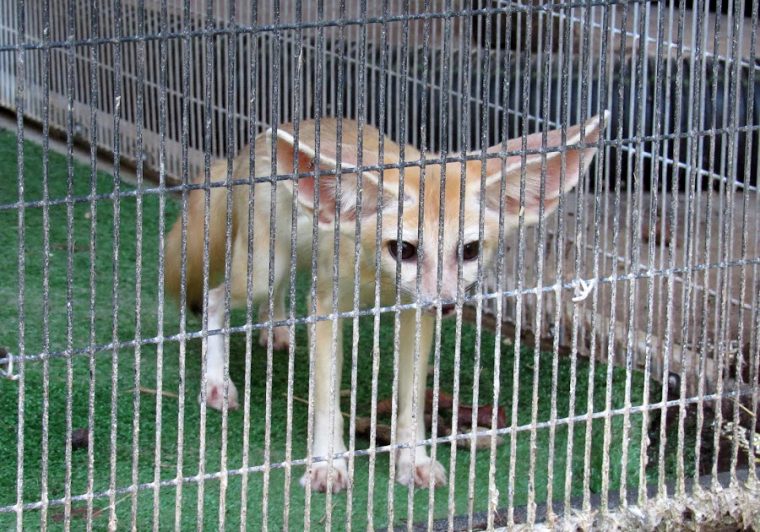 But just six months later, he was cited again for an alarmingly similar incident. A March 2022 inspection resulted in Clay being cited for several non-compliant items, including failing to provide water to two dozen animals in the petting zoo at East Texas Zoo and Gator Park. When an empty trough was filled with water, “[o]ne zebu drank for one minute and one goat drank for one minute and twenty-two seconds,” the inspector noted. “As the inspectors exited the enclosure several more goats proceeded to the trough to drink.”
But just six months later, he was cited again for an alarmingly similar incident. A March 2022 inspection resulted in Clay being cited for several non-compliant items, including failing to provide water to two dozen animals in the petting zoo at East Texas Zoo and Gator Park. When an empty trough was filled with water, “[o]ne zebu drank for one minute and one goat drank for one minute and twenty-two seconds,” the inspector noted. “As the inspectors exited the enclosure several more goats proceeded to the trough to drink.”
Meanwhile, conditions at Clay’s facilities have also put the safety of human visitors at risk. In August 2021, Clay was cited for allowing members of the public to have unsupervised, potentially dangerous contact with animals such as giraffes and kangaroos. “At the time of this inspection, the public was observed feeding and petting these animals through a fence,” a USDA inspector noted. “There were no barriers or readily identifiable attendants visible during these interactions. … The lack of barriers with the larger animals is concerning because these animals can cause serious injury and possibly death to a person, especially a child.”
In the same report, the inspector described conditions inside a “baby room” where Clay allows the public to interact with young animals. In this room, “two coati continuously crawled up the inspector’s legs. The facility representative made the comment ‘the animals crawling on people and scratching people are part of the experience,’” the inspector wrote. Coatis, sometimes called coatimundis, are part of the same family as raccoons and have long, sharp claws.
Meanwhile, the report also documented that a giraffe enclosure was structurally unsound, and both a giraffe and a muntjac (a small deer species) lacked perimeter fences necessary to prevent escape.
Worker Safety Issues Lead to OSHA Complaint
In response to an East Texas Zoo and Gator Park employee’s social media videos — including a November 2020 TikTok documenting serious injuries sustained during an animal attack — the Animal Legal Defense Fund filed a formal complaint with OSHA in April 2022, urging an investigation and appropriate enforcement of workplace safety laws.
The same employee had shared multiple videos of herself in unsafe situations with captive wild animals at the park, including alone in cages with young lions and tigers. The injuries documented in the TikTok at the heart of our OSHA complaint indicate improper handling at Clay’s roadside zoos, conduct that can lead to stress and aggressive behavior on the part of the animals.
“East Texas Zoo and Gator Park consistently fails to meet the minimum standards set forth in the Animal Welfare Act, according to USDA inspection reports. The injuries depicted in the surfaced video clearly shows employees are also in danger. It is simply a matter of time before the next — perhaps fatal — attack occurs. For the safety of the employees and the animals, we urge OSHA to respond to the seriousness of these violations and hold Jason Clay accountable for breaking the law.”
—Animal Legal Defense Fund Executive Director Stephen Wells
Unlawful Breeding and Dealing
Before Clay became the owner of East Texas Zoo and Gator Park, he trafficked wild animals such as endangered lemurs for the previous owners of the facility. And while he was a defendant in a criminal animal trafficking case related to his sale of coatis in a parking lot in 2009, he admitted to buying the animals in order to breed and sell them.
The number and type of animals at his roadside zoos fluctuates significantly, a strong indication that he is continuing to sell and transfer wild animals without the permits required under the AWA. Inspectors have repeatedly cited Clay for failing to keep proper records, including federally required documentation of each AWA-covered animal acquired by or transferred from his facilities. For example, between two inspections of Clay’s Franklin Drive Thru Safari in June and September 2021, the facility experienced massive turnover, with 161 animals transferred or dying and 148 animals arriving or being born at the facility.
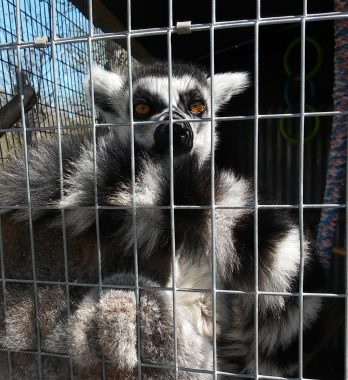 A breeder profile appearing to belong to Clay on a website that facilitates the sale of captive wildlife lists “African hoof stock camels zebras buffalo kangaroo and wallabys” (sic) as animals offered by Clay. Animals acquired or transferred by Clay without required documentation include members of more than two dozen endangered species, including several types of lemur.
A breeder profile appearing to belong to Clay on a website that facilitates the sale of captive wildlife lists “African hoof stock camels zebras buffalo kangaroo and wallabys” (sic) as animals offered by Clay. Animals acquired or transferred by Clay without required documentation include members of more than two dozen endangered species, including several types of lemur.
Acquisition, disposition, and transport records required by the USDA — when properly kept — enable officials to monitor the movements of captive wild animals as they are sold and transferred between roadside zoos and other facilities across the country. To protect these animals and enforce the AWA, authorities first need to know where they are.
A Web of Serial AWA Violators
Often, we see roadside zoos selling, trading, and loaning animals between each other — in many cases, without the documentation required to legally make such transfers.
Previously, the Animal Legal Defense Fund challenged the inhumane treatment of animals at Special Memories Zoo, a Wisconsin roadside zoo — resulting in the zoo, as well as its owner and manager, being permanently banned from possessing or exhibiting animals other than their companion dogs. Several animals from Special Memories Zoo were then transferred to Clay’s facilities without required documentation, including two lynxes, two Rhesus macaques, and two Java macaques.
A Federal Indictment
On June 29, 2022, Clay was among five people indicted by a federal grand jury on charges of illegal wildlife trafficking.
The charges against Clay involve alleged trafficking of a juvenile chimpanzee, an ESA-protected species, in collaboration with Bhagavan “Doc” Antle, a captive wildlife exhibitor and breeder made infamous in the Netflix docuseries Tiger King.
If convicted, Clay could receive a sentence of as much as five years in federal prison in relation to the alleged violations of the ESA and the Lacey Act — the latter a federal law that prohibits the interstate sale or transfer of animals when other laws (such as the ESA) are being violated.
Antle, two of his employees, and the operator of a California “safari bed & breakfast” were additionally charged with various counts of wildlife trafficking by the grand jury. Antle and one employee were also charged with alleged money laundering, which in combination with the trafficking charges could bring sentences of up to 20 years in prison.
You Can Help Protect Animals from Roadside Zoo Cruelty
Join the fight to protect captive wild animals by boycotting businesses like roadside zoos that profit from inhumane treatment; speaking out against cruel animal attractions by writing a letter to the editor or sharing information on social media; and urging your elected officials to support animal-friendly legislation.
Not yet a member of the Animal Legal Defense Fund community? Sign up to receive email alerts or join us on social media to find more opportunities to take action for animals.
United States: Support the Big Cat Public Safety Act
Urge your federal lawmakers to support legislation that would prohibit the private possession of big cats and make it illegal for exhibitors to allow direct contact with cubs.
Related
-
Court Rules Texas Food Label Censorship Law is Unconstitutional
The law imposed unclear and vague standards on plant-based meat producers that violate the First AmendmentJanuary 29, 2026 Press Release -
State Animal Protection Laws Ranked: Oregon is #1, North Dakota #50
20th edition of ALDF state and territory ranking report highlights major advancements & trends in animal protection across the U.S.January 27, 2026 News -
Over 30 Organizations Urge USDA to Limit Federal Support for Manure Digesters
Hundreds of millions of dollars intended to cut energy costs have been funneled to costly manure digesters, benefitting the largest factory farmsJanuary 15, 2026 News


